
As Muslims in North America are becoming more prominent as a consumer group, different non-Muslim businesses and interest groups are making an effort to profit from this opportunity. United Airlines now offers Hindu meals to those Muslims who ask for Halal food.
Similarly Kosher offering businessmen have made an effort to get Muslim inmates to eat Kosher instead of Halal, arguing that it is okay for Muslims to consume that. Recently, Muslim objections to McDonald's French Fries class action settlements were rejected by judge on the ground that Muslims did not file a lawsuit against McDonald's; meanwhile he allocated some cy pres funds for them from the Vegetarian allocation. Some Vegetarian and Muslim groups are appealing the settlement on these grounds. It is, therefore, important for all parties to understand how Halal is different from different Vegetarian dietary practices.
Halal is not Vegetarian:
- Halal is a set of Islamic dietary laws guided by the Quran and the teachings of Allah's prophet Muhammad, may peace and blessings be upon him.
- The source of the dietary decision is the major difference in the Halal diet of Muslims and vegetarianism. Vegetarians' decisions are essentially made by human beings because of health concerns or ideological opposition to eating animals, or in case of Hindu Vegetarians, these are set of rules historically evolved and ordained by Manu Simirti, the Hindu book of laws.
- Unlike most vegetarians, it is permissible for Muslims to eat meat of certain animals as long as they are slaughtered by Muslims after due permission from God by invoking certain phrases according to the rules specified by God's messenger, peace be upon him.
- Vegetarians allow an ingredient in their dietary practices that separate them from Halal, and that is alcohol. Alcohol is usually found in dressings, sauces and in vanilla flavoring. Many Vegetarian recipes call for wine as ingredient. Even the smallest amount of alcohol is forbidden for Muslims.
- Hindu faith based vegetarianism prohibits the use of many vegetables for men of certain castes. For example garlic and onions, which are not prohibited in Islam.
"Garlic, leeks and onions, mushrooms and (all plants), springing from impure (substances), are unfit to be eaten by twice-born men [Brahmins and two other top castes in Indian social system]." The Laws of Manu, translated by G. Buhiler, P. 170, Motilal Banarsidass, Delhi, India 1979 print under UNESCO Collection of Representative works, Indian Series.. - Hindu faith based vegetarianism promotes the use of cow urine, but it is prohibited in Islamic rules of Halal. The Indian government of Gujarat led by Hindu religious government is heavily promoting the consumption of cow urine.
See the story Julian West in New Delhi, A gift from the gods: bottled cow's urine, daily Telegraph, London: 02/09/2001 - Most vegetarians do not eat fish, while it is permissible for Muslims to eat fish.
- Some vegetarians do not eat eggs while Muslims consider that to be Halal.
Not as strict as the Kosher diet rules, but Muslim rules of Halal food are a unique set. It does have similarity with vegetarian or kosher diets in some areas but not in all areas. In the absence of the availability of Halal food, a Muslim is allowed to eat anything which does not include things that are prohibited in Islam. In an extreme situation where there is no choice and it may be a question of life and death, a Muslim can eat even prohibited items only as much as to sustain life with no desire to disobey God.
It is welcoming trend that many people in the food industry are pushing their products to pass as Halal because of growing domestic market for halal in the US and Canada, but also because of export to the other countries where Halal import is a big business. These trends are welcoming and point to the urgent need for Halal groups to work with Vegetarians, Kosher groups, and Organic advocates to collectively enhance the common agenda of healthy diet for all the society.
However, it is also important for Muslims to continue to assert that Halal is a distinct set of dietary rules which should be recognized by all the businesses which we patronize. Since many of the 54 Muslim countries import food items from the US, it is financially beneficial for American food industry to learn about Halal rules and abide by them.
"Artichoke flower and veggies" by Dana Payne - Own work. Licensed under Creative Commons Attribution-Share Alike 3.0 via Wikimedia Commons - http://commons.wikimedia.org/wiki/File:Artichoke_flower_and_veggies.jpg#mediaviewer/File:Artichoke_flower_and_veggies.jpg








Comments
A great article - full of details. I was not aware of the usage of wine in Hindu vegetarian meals. Furthermore, as the Muslim population in America continues to grow and prosper, fast food chains will implement "Halal" measurements only when they feel it is financial benefical or as the Jews have learned, they get political pressure to do so. Go to any supermarket and see how many products are labeled "K" or "U" (for Kosher). THe JEws make up less than 2% of the US population and yet half the manufactorers in the US post the "K" label. Talk about power.
Location
A lot of so called muslims, sell alcohol as well as "halal" food. Can we eat from their places as well?
Location
Here in Spore, less thn 15% of the population are Muslims. We have Halal Macdonalds, Pizza Hut, Burger King, Breeks, Chinese restaurants,Taco Bell, Swensens Ice Cream, Kentucky Fried Chicken. Muslims here used to refrain totally from these establishments. When Malaysia started opening their Halal versions, the Singapore muslims flocked to Malaysia. So, if they can see the economic benefits, insyallah, no suits are necessary. Only your Iman is needed to refrain yourself from eating in non Halal establishments or non Halal airlines.
Location
Pages
Add new comment